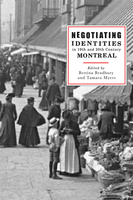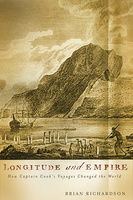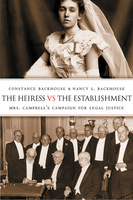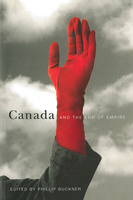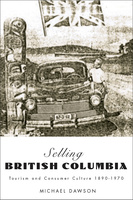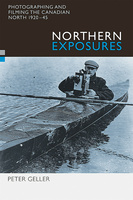Treaty Promises, Indian Reality
Life on a Reserve
In a respectful and personal account of his life and the Cowessess people, Harold LeRat, shares the history and many successes of Indian peoples, despite the numerous challenges they faced.
Negotiating Identities in Nineteenth- and Twentieth-Century Montreal
In this illuminating history of Montreal, readers will discover the links between identity, place, and historical moment as they meet vagrant women, sailors in port, unemployed men of the Great Depression, elite families, shopkeepers, reformers, notaries, and social workers.
Shaped by the West Wind
Nature and History in Georgian Bay
This wide-ranging history of Georgian Bay examines changing cultural representations of landscape over time, shifts between resource development and recreational use, and environmental politics of place -- stories central to the Canadian experience.
Our Box Was Full
An Ethnography for the Delgamuukw Plaintiffs
Daly explores the central meaning of the notion of land in the determination of Aboriginal rights with particular reference to the landmark Delgamuukw case that occupied the British Columbia courts from 1987 to 1997.
Hometown Horizons
Local Responses to Canada's Great War
Alive with personal stories, this book considers how people and communities on the Canadian home front perceived the Great War.
Despotic Dominion
Property Rights in British Settler Societies
Brings together the work of scholars whose study of the evolution of property law in the colonies recognizes the value in locating property law and rights within the broader political, economic, and intellectual contexts of those societies.
Longitude and Empire
How Captain Cook's Voyages Changed the World
This fascinating account offers a new understanding of Captain Cook’s voyages and how they affected the European world view.
The Soldiers' General
Bert Hoffmeister at War
A complex, analytical yet accessible portrait of Bert Hoffmeister, who won more awards than any Canadian officer in the Second World War.
A Breach of Duty
Fiduciary Obligations and Aboriginal Peoples
The government, Guerin, and the golf course: the inside story of the Musqueam people’s 26-year struggle to right the injustice done to them by the federal government in leasing their land as a golf course.
First Nations Sacred Sites in Canada's Courts
This book demonstrates how and why courts have failed to fairly treat First Nations sacred sites, which are under increasing threat worldwide due to state appropriation and insatiable demands on natural resources.
The Heiress vs the Establishment
Mrs. Campbell's Campaign for Legal Justice
A rare first-person account of Canada’s early twentieth century legal system, this books retells the Mrs. Campbell fourteen-year-battle with the Ontario legal establishment to claim her mother’s estate.
Imagining Difference
Legend, Curse, and Spectacle in a Canadian Mining Town
An ethnography about historical and contemporary ideas of human difference expressed by residents of Fernie, BC, a coal-mining town transforming into an international ski resort.
Canada and the End of Empire
This collection deals with a neglected subject in post-Confederation Canadian history – the implications to Canada and Canadians of British decolonization and the end of empire.
From UI to EI
Waging War on the Welfare State
From UI to EI examines the history of Canada’s unemployment insurance system and the rights it grants to the unemployed.
CCF Colonialism in Northern Saskatchewan
Battling Parish Priests, Bootleggers, and Fur Sharks
An elegantly written history that documents the colonial relationship between the CCF and the Saskatchewan north.
Selling British Columbia
Tourism and Consumer Culture, 1890-1970
An entertaining and illustrated account of the development of BC's tourist industry between 1890 and 1970, examining how BC’s history of colonialism was deftly marketed to potential tourists.
Fight or Pay
Soldiers' Families in the Great War
In Fight or Pay, Desmond Morton turns his eye to the stories of those who paid in lieu of fighting – the wives, mothers, and families left behind when soldiers went to war.
Miranda
One of the most significant Supreme Court cases in U.S. history has its roots in Arizona and is closely tied to the state's leading legal figures. Miranda has become a household word; now Gary Stuart tells the inside story of this famous case, and with it the legal history of the accused's right to counsel and silence.
Ernesto Miranda was an uneducated Hispanic man arrested in 1963 in connection with a series of sexual assaults, to which he confessed within hours. He was convicted not on the strength of eyewitness testimony or physical evidence but almost entirely because he had incriminated himself without knowing itand without knowing that he didn't have to. Miranda's lawyers, John P. Frank and John F. Flynn, were among the most prominent in the state, and their work soon focused the entire country on the issue of their client's rights. A 1966 Supreme Court decision held that Miranda's rights had been violated and resulted in the now-famous "Miranda warnings." Stuart personally knows many of the figures involved in Miranda, and here he unravels its complex history, revealing how the defense attorneys created the argument brought before the Court and analyzing the competing societal interests involved in the case. He considers Miranda's aftermathnot only the test cases and ongoing political and legal debate but also what happened to Ernesto Miranda. He then updates the story to the Supreme Court's 2000 Dickerson decision upholding Miranda and considers its implications for cases in the wake of 9/11 and the rights of suspected terrorists. Interviews with 24 individuals directly concerned with the decisionlawyers, judges, and police officers, as well as suspects, scholars, and ordinary citizensoffer observations on the case's impact on law enforcement and on the rights of the accused.
Ten years after the decision in the case that bears his name, Ernesto Miranda was murdered in a knife fight at a Phoenix bar, and his suspected killer was "Mirandized" before confessing to the crime. Miranda: The Story of America's Right to Remain Silent considers the legacy of that case and its fate in the twenty-first century as we face new challenges in the criminal justice system.
Northern Exposures
Photographing and Filming the Canadian North, 1920-45
Illustrated throughout with archival photographs, this book examines the photographic and film practice of the Canadian government, the Anglican Church of Canada, and the Hudson’s Bay Company, the three major colonial institutions involved in the arctic and sub-arctic.


